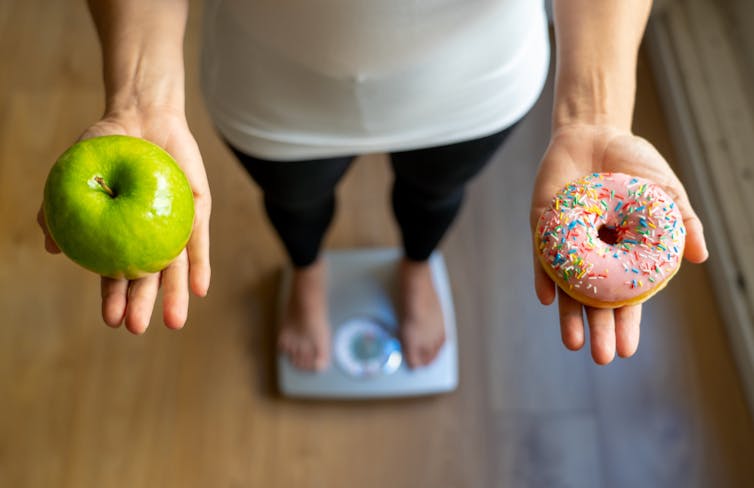Not feeling motivated to tackle those sneaky COVID kilos? Try these 4 healthy eating tips instead
- Written by Clare Collins, Laureate Professor in Nutrition and Dietetics, University of Newcastle
In Australia and around the world, research is showing changes in body weight, cooking, eating and drinking patterns associated with COVID lockdowns.
Some changes have been positive, such as people cooking at home more, and eating more vegetables.
But many people have also reported snacking more, and eating and drinking in response to stress.
As the new year starts, you may be planning to tackle COVID-related weight gain. Before you do, consider that it may be better to focus on your eating patterns, rather than looking to the latest fad diet.
Emotional eating and weight gain
A survey of 13,829 Australian adults found one in five reported drinking more alcohol during COVID. In a survey of over 22,000 drinkers in the United Kingdom, one-quarter reported drinking more than usual over the previous week.
In Italy, of 602 people surveyed about changes in their eating habits during isolation, almost half said they sought “comfort foods” and ate more to feel better.
Eating and drinking alcohol boosts the release of “feel good” chemicals in your brain, making you feel better in the short term.
During times of stress, anxiety and boredom, like during lockdown, food and alcohol can seem like a quick fix. But overindulging isn’t going to help you in the long term.
 A new year can be a good time to think about your eating habits.
Shutterstock
A new year can be a good time to think about your eating habits.
Shutterstock
According to a global WebMD poll on self-reported weight gain during the pandemic, about one-quarter of people in Hong Kong and Germany reported gaining weight, roughly 45% in Australia, Canada and the UK, and over 60% in Brazil and Italy.
United States respondents who reported putting on weight were asked to estimate how much weight they thought they had gained. Some 49% said less than 3 kilograms, 26% said 3-4kg, and 25% reported more than 4.5kg.
Participants believed a lack of exercise, stress eating and drinking more alcohol were contributing factors.
Read more: Health Check: what's the best diet for weight loss?
It’s not just about weight
While weight gain can increase your risk of health problems, recent research suggests having healthy eating patterns is more important than weight.
A US study of 210,000 adults followed for up to 32 years found that irrespective of body weight, having a high diet quality was associated with lower risk of heart disease and stroke compared to having low diet quality.
A “high-quality” diet includes lots of variety within the basic food groups of vegetables, fruit and wholegrains, and includes limited junk food. A “low-quality diet” is the opposite.
Similarly, a Swedish study followed 79,000 adults over 21 years and found that among people with a higher body weight, also having a high-quality diet was protective against dying from any cause. But having a body weight in the healthy range was not protective among those who had a low-quality diet.
While higher diet quality is associated with better overall health, increasing your diet quality can also help reduce weight.
Read more: Health Check: six tips for losing weight without fad diets
4 tips to improve your diet and beat COVID kilos
Home cooking and eating together
If you spent more time cooking and eating meals at home during the pandemic, keep doing it. As well as being better for you than eating take-away foods and ready-made meals, it promotes well-being.
A study of 160 adults found people who ate healthy foods cooked at home experienced more intense positive emotions and worried less, compared to people who ate away from home.
For adolescents, a review found frequent family meals were associated higher self-esteem and other indicators of better mental health.
 Many people were cooking and eating at home more during lockdown.
Shutterstock
Many people were cooking and eating at home more during lockdown.
Shutterstock
Eat more vegetables and fruit
A US study of 133,468 adults found those who increased their vegetable and fruit intakes lost weight. Every extra daily serve of fruit was associated with a weight loss of 250 grams over a four-year period, and every extra daily serve of vegetables with a loss of 110 grams. People who ate more berries, apples, pears, cauliflower, green leafy vegetables and carrots experienced greater weight loss.
This has well-being benefits too. For example, an Australian study which followed 12,385 adults from 2007 to 2013 and found greater life satisfaction, happiness and well-being among those who increased their intake of vegetables and fruit.
Try buying bigger quantities and a greater variety of vegetables and fruit when you do your grocery shopping.
Keep a food diary
Recording what you eat and drink and then checking the kilojoule and nutrient content helps boost your knowledge of what’s in various foods and drinks. It also increases awareness of your eating habits, especially snacking. You can use an app or pen and paper.
Once you’ve recorded your food and drink intake for a few days, you will notice areas to target for improvement.
You might also consider keeping a mood diary. This can help you identify other ways to improve your diet quality. The mood you’re in affects your food choices and your food choices affect your mood. Keeping track of both food and mood helps to identify triggers for eating.
Plan meals and snacks ahead
Check what ingredients you already have and plan meals and snacks to use these up. Next write a grocery list, just for what you need. Even if you’re staying home, prepare your lunch and snacks for the day in advance. This saves you time, money, limits food waste and reduces the number of times you have to think about food.
Read more: How we cook changed during lockdown – and we can learn from this for life after the pandemic
Visit the No Money No Time website to check your diet quality score using our free healthy eating quiz and find simple, inexpensive and healthy recipes.
If you’d like to learn more about food, nutrition and weight management, enrol in our free online course, The Science of Weight Loss – Dispelling Diet Myths, which starts on January 27.
Authors: Clare Collins, Laureate Professor in Nutrition and Dietetics, University of Newcastle




